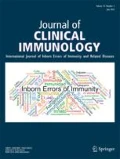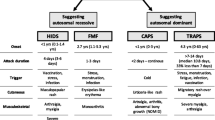Abstract
Objective
To evaluate the prevalence of genetic defects in clinically suspected autoinflammatory syndromes (AIS) in a Brazilian multicenter study.
Methods
The study included 102 patients with a clinical diagnosis of Cryopyrin Associated Periodic Syndromes (CAPS), TNF Receptor Associated Periodic Syndrome (TRAPS), Familial Mediterranean Fever (FMF), Mevalonate Kinase Deficiency (MKD) and Pediatric Granulomatous Arthritis (PGA). One of the five AIS-related genes (NLRP3, TNFRSF1A, MEFV, MVK and NOD2) was evaluated in each patient by direct DNA sequencing, based on the most probable clinical suspect.
Results
Clinical diagnoses of the 102 patients were: CAPS (n = 28), TRAPS (n = 31), FMF (n = 17), MKD (n = 17) and PGA (n = 9). Of them, 27/102 (26 %) had a confirmed genetic diagnosis: 6/28 (21 %) CAPS patients, 7/31 (23 %) TRAPS, 3/17 (18 %) FMF, 3/17 (18 %) MKD and 8/9 (89 %) PGA.
Conclusion
We have found that approximately one third of the Brazilian patients with a clinical suspicion of AIS have a confirmed genetic diagnosis.
Similar content being viewed by others
References
Masters SL, Simon A, Aksentijevich I, Kastner DL. Horror autoinflammaticus: the molecular pathophysiology of autoinflammatory disease (*). Annu Rev Immunol. 2009;27:621–68.
Goldbach-Mansky R. Current status of understanding the pathogenesis and management of patients with NOMID/CINCA. Curr Rheumatol Rep. 2011;13:123–31.
Bernot A, Clepet C, Dasilva C, Devaud C, Petit JL, Caloustian C, et al. A candidate gene for familial Mediterranean fever. The French FMF Consortium. Nat Genet. 1997;17:25–31.
Ancient missense mutations in a new member of the RoRet gene family are likely to cause familial Mediterranean fever. The International FMF Consortium. Cell. 1997;90:797-807.
McDermott MF, Aksentijevich I, Galon J, McDermott EM, Ogunkolade BW, Centola M, et al. Germline mutations in the extracellular domains of the 55 kDa TNF receptor, TNFR1, define a family of dominantly inherited autoinflammatory syndromes. Cell. 1999;97:133–44.
Miceli-Richard C, Lesage S, Rybojad M, Prieur AM, Manouvrier-Hanu S, Häfner R, et al. CARD15 mutations in Blau syndrome. Nat Genet. 2001;29:19–20.
Feldmann J, Prieur AM, Quartier P, Berquin P, Certain S, Cortis E, et al. Chronic infantile neurological cutaneous and articular syndrome is caused by mutations in CIAS1, a gene highly expressed in polymorphonuclear cells and chondrocytes. Am J Hum Genet. 2002;71:198–203.
Aksentijevich I, Nowak M, Mallah M, Chae JJ, Watford WT, Hofmann SR, et al. De novo CIAS1 mutations, cytokine activation, and evidence for genetic heterogeneity in patients with neonatal-onset multisystem inflammatory disease (NOMID): a new member of the expanding family of pyrin-associated autoinflammatory diseases. Arthritis Rheum. 2002;46:3340–8.
Hoffman HM, Mueller JL, Broide DH, Wanderer AA, Kolodner RD. Mutation of a new gene encoding a putative pyrin-like protein causes familial cold autoinflammatory syndrome and Muckle-Wells syndrome. Nat Genet. 2001;29:301–5.
Drenth JP, Cuisset L, Grateau G, Vasseur C, van de Velde-Visser SD, de Jong JG, et al. Mutations in the gene encoding mevalonate kinase cause hyper-IgD and periodic fever syndrome. International Hyper-IgD Study Group. Nat Genet. 1999;22:178–81.
Aksentijevich I, Masters SL, Ferguson PJ, Dancey P, Frenkel J, van Royen-Kerkhoff A, et al. An autoinflammatory disease with deficiency of the interleukin-1-receptor antagonist. N Engl J Med. 2009;360:2426–37.
Gattorno M, Sormani MP, D'Osualdo A, Pelagatti MA, Caroli F, Federici S, et al. A diagnostic score for molecular analysis of hereditary autoinflammatory syndromes with periodic fever in children. Arthritis Rheum. 2008;58:1823–32.
Toplak N, Dolezalovà P, Constantin T, Sedivà A, Pašić S, Cižnar P, et al. Periodic fever syndromes in Eastern and Central European countries: results of a pediatric multinational survey. Pediatr Rheumatol Online J. 2010;8:29.
Jesus AA, Silva CA, Segundo GR, Aksentijevich I, Fujihira E, Watanabe M, et al. Phenotype-genotype analysis of cryopyrin-associated periodic syndromes (CAPS): description of a rare non-exon 3 and a novel CIAS1 missense mutation. J Clin Immunol. 2008;28:134–8.
Touitou I, Lesage S, McDermott M, Cuisset L, Hoffman H, Dode C, et al. Infevers: an evolving mutation database for auto-inflammatory syndromes. Hum Mutat. 2004;24:194–8.
Cuisset L, Jeru I, Dumont B, Fabre A, Cochet E, Le Bozec J, et al. Mutations in the autoinflammatory cryopyrin-associated periodic syndrome gene: epidemiological study and lessons from eight years of genetic analysis in France. Ann Rheum Dis. 2011;70:495–9.
Aksentijevich I, D Putnam C, Remmers EF, Mueller JL, Le J, Kolodner RD, et al. The clinical continuum of cryopyrinopathies: novel CIAS1 mutations in North American patients and a new cryopyrin model. Arthritis Rheum. 2007;56:1273–85.
Kümmerle-Deschner JB, Tyrrell PN, Reess F, Kötter I, Lohse P, Girschick H, et al. Risk factors for severe Muckle-Wells syndrome. Arthritis Rheum. 2010;62:3783–91.
Adzhubei IA, Schmidt S, Peshkin L, Ramensky VE, Gerasimova A, Bork P, et al. A method and server for predicting damaging missense mutations. Nat Methods. 2010;7:248–9.
Schwarz JM, Rodelsperger C, Schuelke M, Seelow D. MutationTaster evaluates disease-causing potential of sequence alterations. Nat Methods. 2010;7:575–6.
Aganna E, Martinon F, Hawkins PN, Ross JB, Swan DC, Booth DR, et al. Association of mutations in the NALP3/CIAS1/PYPAF1 gene with a broad phenotype including recurrent fever, cold sensitivity, sensorineural deafness, and AA amyloidosis. Arthritis Rheum. 2002;46:2445–52.
Sherry ST, Ward MH, Kholodov M, Baker J, Phan L, Smigielski EM, et al. dbSNP: the NCBI database of genetic variation. Nucleic Acids Res. 2001;29:308–11.
Neven B, Callebaut I, Prieur AM, Feldmann J, Bodemer C, Lepore L, et al. Molecular basis of the spectral expression of CIAS1 mutations associated with phagocytic cell-mediated autoinflammatory disorders CINCA/NOMID, MWS, and FCU. Blood. 2004;103:2809–15.
Aksentijevich I, Galon J, Soares M, Mansfield E, Hull K, Oh HH, et al. The tumor-necrosis-factor receptor-associated periodic syndrome: new mutations in TNFRSF1A, ancestral origins, genotype-phenotype studies, and evidence for further genetic heterogeneity of periodic fevers. Am J Hum Genet. 2001;69:301–14.
Ravet N, Rouaghe S, Dodé C, Bienvenu J, Stirnemann J, Lévy P, et al. Clinical significance of P46L and R92Q substitutions in the tumour necrosis factor superfamily 1A gene. Ann Rheum Dis. 2006;65:1158–62.
Jadoul M, Dodé C, Cosyns JP, Abramowicz D, Georges B, Delpech M, et al. Autosomal-dominant periodic fever with AA amyloidosis: Novel mutation in tumor necrosis factor receptor 1 gene. Rapid communication. Kidney Int. 2001;59:1677–82.
Cazeneuve C, Dode C, Delpech M, Touitou I, Grateau G. Amselem S [French Society for Human Genetics. “Genetics in Practice” Commission. Core scientific data of use in genetic counseling. Familial Mediterranean fever]. Ann Genet. 1999;42:241–5.
Ryan JG, Masters SL, Booty MG, Habal N, Alexander JD, Barham BK, et al. Clinical features and functional significance of the P369S/R408Q variant in pyrin, the familial Mediterranean fever protein. Ann Rheum Dis. 2010;69:1383–8.
Kilim Y, Magal N, Shohat M. Expanding the panel of MEFV mutations for routine testing of patients with a clinical diagnosis of familial Mediterranean fever. Isr Med Assoc J. 2011;13:206–8.
Bidari A, Ghavidel-Parsa B, Najmabadi H, Talachian E, Haghighat-Shoar M, Broumand B, et al. Common MEFV mutation analysis in 36 Iranian patients with familial Mediterranean fever: clinical and demographic significance. Mod Rheumatol. 2010;20:566–72.
Albayrak F, Selcuk NY, Odabas AR, Cetinkaya R, Pirim I. Genotype-phenotype correlation in patients with familial Mediterranean fever in East Anatolia (Turkey). Genet Test Mol Biomarkers. 2010;14:325–8.
Yilmaz R, Ozer S, Ozyurt H, Erkorkmaz U, Sahin S. Familial Mediterranean fever gene mutations in the inner northern region of Turkey and genotype-phenotype correlation in children. J Paediatr Child Health. 2009;45:641–5.
Fisher BA, Lachmann HJ, Rowczenio D, Goodman HJ, Bhalara S, Hawkins PN. Colchicine responsive periodic fever syndrome associated with pyrin I591T. Ann Rheum Dis. 2005;64:1384–5.
Aldea A, Casademont J, Aróstegui JI, Rius J, Masó M, Vives J, et al. I591T MEFV mutation in a Spanish kindred: is it a mild mutation, a benign polymorphism, or a variant influenced by another modifier? Hum Mutat. 2002;20:148–50.
Touitou I. The spectrum of Familial Mediterranean Fever (FMF) mutations. Eur J Hum Genet. 2001;9:473–83.
van der Hilst JC, Bodar EJ, Barron KS, Frenkel J, Drenth JP, van der Meer JW, et al. Long-term follow-up, clinical features, and quality of life in a series of 103 patients with hyperimmunoglobulinemia D syndrome. Medicine (Baltimore). 2008;87:301–10.
Hinson DD, Ross RM, Krisans S, Shaw JL, Kozich V, Rolland MO, et al. Identification of a mutation cluster in mevalonate kinase deficiency, including a new mutation in a patient of Mennonite ancestry. Am J Hum Genet. 1999;65:327–35.
Houten SM, Kuis W, Duran M, de Koning TJ, van Royen-Kerkhof A, Romeijn GJ, et al. Mutations in MVK, encoding mevalonate kinase, cause hyperimmunoglobulinaemia D and periodic fever syndrome. Nat Genet. 1999;22:175–7.
Mandey SH, Schneiders MS, Koster J, Waterham HR. Mutational spectrum and genotype-phenotype correlations in mevalonate kinase deficiency. Hum Mutat. 2006;27:796–802.
Rosé CD, Aróstegui JI, Martin TM, Espada G, Scalzi L, Yagüe J, et al. NOD2-associated pediatric granulomatous arthritis, an expanding phenotype: study of an international registry and a national cohort in Spain. Arthritis Rheum. 2009;60:1797–803.
Gattorno M, Caorsi R, Meini A, Cattalini M, Federici S, Zulian F, et al. Differentiating PFAPA syndrome from monogenic periodic fevers. Pediatrics. 2009;124:e721–8.
Federici L, Rittore-Domingo C, Koné-Paut I, Jorgensen C, Rodière M, Le Quellec A, et al. A decision tree for genetic diagnosis of hereditary periodic fever in unselected patients. Ann Rheum Dis. 2006;65:1427–32.
Simon A, van der Meer JW, Vesely R, Myrdal U, Yoshimura K, Duys P, et al. Approach to genetic analysis in the diagnosis of hereditary auto-inflammatory syndromes. Rheumatology (Oxford). 2006;45:269–73.
Tchernitchko D, Moutereau S, Legendre M, Delahaye A, Caze-neuve C, Lacombe C, et al. MEFV analysis is of particularly weak diagnostic value for recurrent fevers in Western European Caucasian patients. Arthritis Rheum. 2005;52:3603-5.
Acknowledgments
This study was supported by Fundação de Amparo à Pesquisa do Estado de São Paulo – FAPESP (grants 2008/58866-5 and 2009/12334-5), Conselho Nacional de Desenvolvimento Científico e Tecnológico – CNPQ (grant 300248/2008-3 to CAS) and Federico Foundation Grant to CAS. We thank the following pediatric rheumatologists and pediatricians and their respective services for sample referral: Nadyesda D. Brandão (Universidade Federal de Santa Catarina), Ana Paula Vecchi (Hospital Materno-Infantil de Goiânia), Maria Custodia M. Ribeiro and Fabio Tadeu M. Oliveira (Universidade de Brasília), Erica N. Naka and Izaias P. Costa (Universidade Federal do Mato Grosso do Sul), Katia Lino (Universidade Federal Fluminense), Maria Virginia Andrade (Hospital das Clínicas da Faculdade de Medicina de Marília), Silvana B. Sacchetti (Irmandade da Santa Casa de Misericórdia de São Paulo), Simone Lotufo (Hospital Municipal Menino Jesus), Ana Julia P. Moraes (Universidade Federal do Pará), Tereza C Robazzi (Universidade Federal da Bahia), Claudia Saad-Magalhães (Universidade Estadual de São Paulo-Botucatu) and Mayra B. Dorna (Instituto da Criança da FMUSP). We also thank Paolo Zanotto (Laboratório de Evolução Molecular e Bioinformática, ICBII, USP, José Eduardo Krieger (Laboratório de Genética e Cardiologia Molecular, FMUSP), Claudio Panutti (Laboratório de Virologia, FMUSP), Silvia Figueiredo Costa (Laboatório de Bacteriologia, FMUSP) and Suzane Ono-Nita (Laboratório de Gastroenterologia Clínica e Experimental) for the use of equipments.
Author information
Authors and Affiliations
Corresponding authors
Additional information
Adriana A. Jesus, and Erika Fujihira, Clovis A. Silva and Joao B. Oliveira contributed equally to this work.
Rights and permissions
About this article
Cite this article
Jesus, A.A., Fujihira, E., Watase, M. et al. Hereditary Autoinflammatory Syndromes: A Brazilian Multicenter Study. J Clin Immunol 32, 922–932 (2012). https://doi.org/10.1007/s10875-012-9688-x
Received:
Accepted:
Published:
Issue Date:
DOI: https://doi.org/10.1007/s10875-012-9688-x




